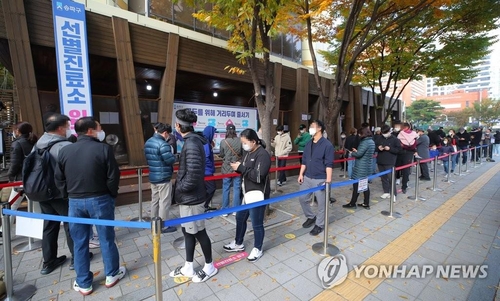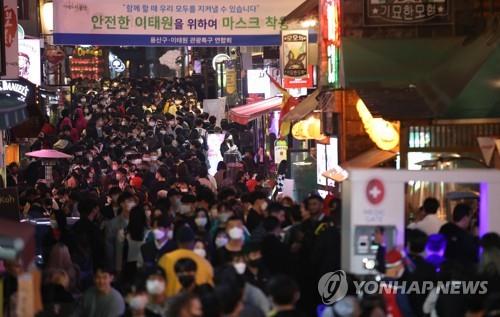- California Assembly OKs highest minimum wage in nation
- S. Korea unveils first graphic cigarette warnings
- US joins with South Korea, Japan in bid to deter North Korea
- LPGA golfer Chun In-gee finally back in action
- S. Korea won’t be top seed in final World Cup qualification round
- US men’s soccer misses 2nd straight Olympics
- US back on track in qualifying with 4-0 win over Guatemala
- High-intensity workout injuries spawn cottage industry
- CDC expands range of Zika mosquitoes into parts of Northeast
- Who knew? ‘The Walking Dead’ is helping families connect
New cases over 2,400 for 2nd day; deaths reach 10-month high amid eased restrictions
South Korea’s new coronavirus cases stayed above 2,400 for the second consecutive day Thursday as the country relaxed its virus restrictions nationwide in line with its “living with COVID-19″ scheme.
The country reported 2,482 new COVID-19 cases, raising the total caseload to 373,120, the Korea Disease Control and Prevention Agency (KDCA) said.
New cases slipped a bit from the previous day’s 2,667, which marked the fourth largest ever and the first time since Sept. 30 that daily infection cases exceeded 2,500. But the tally went up by 371 from a week ago.
The death toll rose to a 10-month high of 24, bringing the total number to 2,916. The number marked the highest since Jan. 12, when 25 people died of COVID-19. The fatality rate came to 0.78 percent.
Of the 24 people, 14 people, or 58.3 percent, were unvaccinated, and four people, or 16,7 percent, had received their first shots. Six people were fully inoculated against the coronavirus, the authorities said.
All the people were aged over 60, and 22 people had underlying health issues.
Deaths have been on a steady rise since Monday, when nine people were confirmed dead of the virus.
As of 6 p.m., 1,687 new cases had been reported, down 5 from the previous day, according to local governments and health authorities, excluding the southeastern city of Busan, which stopped releasing real-time data from Monday. Cases are counted until midnight and announced the following morning.


Seoul citizens wait in line to get tested for the coronavirus at a testing center in eastern Seoul on Nov. 4, 2021. (Yonhap)
The health authorities warned virus cases could continue to trend upward again, especially after the Halloween weekend when once-empty popular nightlife districts became bustling and busy again with young people.
A rise in outdoor and social activities nationwide, seen in data such as credit card spending and highway traffic volume, spurs concerns about more virus transmissions.
The seven-day average from Oct. 28 to Nov. 4 was 2,101.7, the first time since Oct. 8 that the tally surpassed 2,000.
The KDCA said 75.9 percent of the country’s 52 million population are fully vaccinated and 80.5 percent received their first shots.
More than 70 percent of new COVID-19 patients have not been vaccinated, with 24 percent of them in their teens.
Of the total, 2,457 were local infections and twenty-five cases came from overseas, putting the cumulative total at 15,174.
Of the locally transmitted cases, Seoul had 946 cases, with the surrounding Gyeonggi Province logging 873 cases and Incheon, 40 kilometers west of Seoul, 171 cases.
Currently, private gatherings of up to 10 people are allowed, regardless of vaccination. Still, wearing a face mask indoors is mandated.
While restrictions on restaurants, cafes and movie theaters are fully lifted, high-risk facilities, such as bars and nightclubs, are required to implement the “vaccine pass” system where visitors have to show they have been fully vaccinated or have a negative test result.











